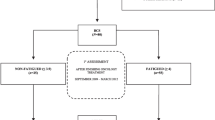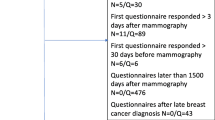Abstract
Purpose
Fatigue is a phenomenon that may persist for years after completion of adjuvant therapy, and is one of the most frequent symptoms associated with breast cancer survivors. The purposes of this study were to investigate the occurrence of fatigue in disease-free breast cancer survivors after treatment, to identify variables associated with fatigue, and to evaluate the impact of fatigue on health-related quality of life.
Methods
A cross-sectional study was conducted on 202 consecutive women diagnosed with in-situ to Stage III breast cancer attending in outpatient facilities of two large hospitals, one year or more after diagnosis. They completed the Piper Fatigue Scale-Revised and the European Organization for Research and Treatment of Cancer QLQ-C30. Multiple logistic regression models were used to identify predictive factors associated with fatigue. EORTC QLQC-30 scores for fatigued survivors were compared to non-fatigued survivors.
Results
The prevalence of fatigue reported by the breast cancer survivors was 37.6%. Multiple logistic regression analysis revealed that predictive factors for fatigue included younger age (odds ratio [OR]=2.23, 95% confidence interval [CI]=1.11–4.45, p = 0.024); presence of pain (OR = 3.87, 95% CI = 1.88-7.98, p = 0.000); dyspnea (OR = 3.72, 95% CI = 1.46–9.50, p = 0.006); insomnia (OR = 2.40, 95% CI = 1.19–4.86, p = 0.015); and nausea and vomiting (OR = 12.25, 95% CI = 1.18–126.75, p = 0.036). Fatigued women had poorer health-related quality of life than non-fatigued women in all domains.
Conclusion
Our results suggest that many disease-free breast cancer survivors after treatment experienced fatigue that compromises their health-related quality of life.
Similar content being viewed by others
References
Parkin DM, Bray F, Ferlay J, Pisani P (2005) Global cancer statistics. CA Cancer J Clin 55:74–108
Instituto Nacional do Câncer (National Institute of Cancer)-Brasil (2009) Incidence estimative in Brazil 2010. http://www.inca.gov.br/estimativa/2010/estimativa20091201.pdf. Accessed 14 May 2010
American Cancer Society (2010) Cancer Facts & Figures 2010. http://www.cancer.org/acs/groups/content/@epidemiologysurveilance/documents/document/acspc-026238.pdf. Accessed 01 December 2010
Alexander S, Minton O, Andrews P, Stone PA (2009) Comparison of the characteristics of disease-free breast cancer survivors with or without cancer-related fatigue syndrome. Eur J Cancer 45:384–392
Andrykowski MA, Curran SL, Lightner R (1998) Off-treatment fatigue in breast cancer survivors: a controlled comparison. J Behav Med 21:1–18
Bower JE, Ganz PA, Desmond KA et al (2000) Fatigue in breast cancer survivors: occurrence, correlates and impact on quality of life. J Clin Oncol 18:743–753
Bower JE, Ganz PA, Desmond KA et al (2006) Fatigue in long-term breast carcinoma survivors: a longitudinal investigation. Cancer 106:751–758
Broeckel JA, Jacobsen PB, Horton J, Balducci L, Lyman GH (1998) Characteristics and correlates of fatigue after adjuvant chemotherapy for breast cancer. J Clin Oncol 16:1689–1696
Fan HG, Houédé-Tchen N, Yi QL et al (2005) Fatigue, menopausal symptoms, and cognitive function in women after adjuvant chemotherapy for breast cancer: 1- and 2-year follow-up of a prospective controlled study. J Clin Oncol 23:8025–8032
Gelinas C, Fillion L (2004) Factors related to persistent fatigue following completion of breast cancer treatment. Oncol Nurs Forum 31:269–278
Goldstein D, Bennett B, Friedlander M et al (2006) Fatigue states after cancer treatment occur both in association with, and independent of, mood disorder: a longitudinal study. BMC Cancer. doi:10.1186/1471-2407-6-240
Kim SH, Son BH, Hwang SY et al (2008) Fatigue and depression in disease-free breast cancer survivors: prevalence, correlates, and association with quality of life. J Pain Symptom Manage 35:644–655
Meeske K, Smith AW, Alfano CM et al (2007) Fatigue in breast cancer survivors two to five years post diagnosis: a HEAL Study report. Qual Life Res 16:947–960
Nieboer P, Buijs C, Rodenhuis S et al (2005) Fatigue and relating factors in high-risk breast cancer patients treated with adjuvant standard or high-dose chemotherapy: a longitudinal study. J Clin Oncol 23:8296–8304
Okuyama T, Akechi T, Kugaya A et al (2000) Factors correlated with fatigue in disease-free breast cancer patients: application of the Cancer Fatigue Scale. Support Care Cancer 8:215–222
Servaes P, Verhagen S, Bleijenberg G (2002) Determinants of chronic fatigue in disease-free breast cancer patients: a cross-sectional study. Ann Oncol 13:589–598
Servaes P, Gielissen MF, Verhagen S, Bleijenberg G (2007) The course of severe fatigue in disease-free breast cancer patients: a longitudinal study. Psycho-Oncology 16:787–795
Sugawara Y, Akechi T, Okuyama T et al (2005) Occurrence of fatigue and associated factors in disease-free breast cancer patients without depression. Support Care Cancer 13:628–636
Young KE, White CA (2006) The prevalence and moderators of fatigue in people who have been successfully treated for cancer. J Psychosom Res 60:29–38
Minton O, Stone P (2008) How common is fatigue in disease-free breast cancer survivors? A systematic review of the literature. Breast Cancer Res Treat 112:5–13
Baker F, Denniston M, Smith T, West MM (2005) Adult cancer survivors: how are they faring? Cancer 104:2565–2576
Mock V (2001) Fatigue management: evidence and guidelines for practice. Cancer 92:1699–1707
Piper BF, Dibble SL, Dodd MJ et al (1998) The revised Piper Fatigue Scale: psychometric evaluation in women with breast cancer. Oncol Nurs Forum 25:677–684
Cella D, Davis K, Breitbart W, Curt G (2001) Cancer-related fatigue: prevalence of proposed diagnostic criteria in a United States sample of cancer survivors. J Clin Oncol 19:3385–3391
Bower JE, Ganz PA, Aziz N, Fahey JL (2002) Fatigue and proinflammatory cytokine activity in breast cancer survivors. Psychosom Med 64:604–611
Landmark-Høyvik H, Reinertsen KV, Loge JH et al (2009) Alterations of gene expression in blood cells associated with chronic fatigue in breast cancer survivors. Pharmacogenomics J 9:333–340
Collado-Hidalgo A, Bower JE, Ganz PA, Irwin MR, Cole SW (2008) Cytokine gene polymorphisms and fatigue in breast cancer survivors: early findings. Brain Behav Immun 22:1197–1200
Mota DD, Pimenta CA, Piper BF (2009) Fatigue in Brazilian cancer patients, caregivers, and nursing students: a psychometric validation study of the Piper Fatigue Scale-Revised. Support Care Cancer 17:645–652
Fayers PM, Aaronson NK, Bjordal K et al (2001) European Organisation for Research and Treatment of Cancer QLQ-C30 Scoring Manual, 3rd edn. EORTC Quality of Life Group, Brussels
Aaronson NK, Ahmedzai S, Bergman B et al (1993) The European Organization for Research and Treatment of Cancer QLQ-C30: a quality-of-life instrument for use in international clinical trials in oncology. J Natl Cancer Inst 85:365–376
Fêde AB, Bensi CG, Trufelli DC et al (2007) Multivitamins do not improve radiation therapy-related fatigue: results of a double-blind randomized crossover trial. Am J Clin Oncol 30:432–436
Samano ES, Goldenstein PT, Ribeiro LM et al (2004) Praying correlates with higher quality of life: results from a survey on complementary/alternative medicine use among a group of Brazilian cancer patients. São Paulo Med J 122:60–63
Santos FR, Kozasa EH, Chauffaille ML, Colleoni GW, Leite JR (2006) Psychosocial adaptation and quality of life among Brazilian patients with different hematological malignancies. J Psychosom Res 60:505–511
Mock V, Atkinson A, Barsevick A et al (2000) NCCN practice guidelines for cancer-related fatigue. Oncology (Huntingt) 14:151–161
Meeske KA, Siegel SE, Globe DR, Mack WJ, Bernstein L (2005) Prevalence and correlates of fatigue in long-term survivors of childhood leukemia. J Clin Oncol 23:5501–5510
Ahn SH, Park BW, Noh DY et al (2007) Health-related quality of life in disease-free survivors of breast cancer with the general population. Ann Oncol 18:173e182
Fayers PM (2001) Interpreting quality of life data: population-based reference data for the EORTC QLQ-C30. Eur J Cancer 37:1331–1334
Boehmer S, Luszczynska A (2006) Two kinds of items in quality of life instruments: ‘indicator and causal variables’ in the EORTC QLQ-C30. Qual Life Res 15:131–141
Jud SM, Fasching PA, Maihöfner C et al (2010) Pain perception and detailed visual pain mapping in breast cancer survivors. Breast Cancer Res Treat 119:105–110
Peuckmann V, Ekholm O, Rasmussen NK et al (2009) Chronic pain and other sequelae in long-term breast cancer survivors: nationwide survey in Denmark. Eur J Pain 13:478–485
Farncomb M (1997) Dyspnea: assessment and treatment. Support Care Cancer 5:94–99
Brown ML, Carrieri V, Janson-Bjerklie S, Dodd M (1986) Lung cancer and dyspnea. Oncol Nurs Forum 13:19–24
Bardwell WA, Ancoli-Israel S (2008) Breast cancer and fatigue. Sleep Med Clin 3:61–71
Naeim A, Dy SM, Lorenz KA, Sanati HAW, Asch SM (2008) Evidence-based recommendations for cancer nausea and vomiting. J Clin Oncol 26:3903–3910
Acknowledgments
We thank all the women who took part in this research.
Conflicts of interest
The authors of this study did not receive any financial support for this study and declare no conflict of interest.
Author information
Authors and Affiliations
Corresponding author
Rights and permissions
About this article
Cite this article
Cavalli Kluthcovsky, A.C.G., Urbanetz, A.A., de Carvalho, D.S. et al. Fatigue after treatment in breast cancer survivors: prevalence, determinants and impact on health-related quality of life. Support Care Cancer 20, 1901–1909 (2012). https://doi.org/10.1007/s00520-011-1293-7
Received:
Accepted:
Published:
Issue Date:
DOI: https://doi.org/10.1007/s00520-011-1293-7




